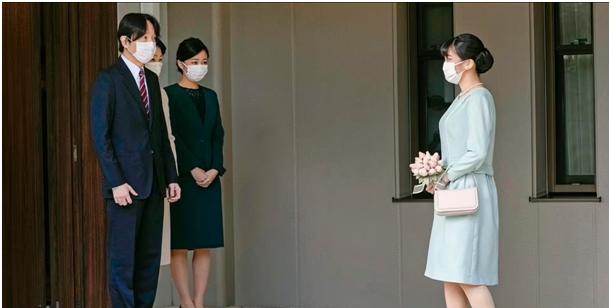[South + October 27] According to British media reports, Princess Mako, the eldest daughter of The Japanese Emperor Akishinomiya Prince Fumihito, gave up her royal title and a dowry of 150 million yen (about 8.43 million yuan) to officially marry her commoner husband, Kei Komuro. The years-long "Princess Wedding" has finally come to an end.

On the morning of October 26, local time, Princess Mako, dressed in a blue dress and holding a bouquet of white flowers, bowed outside the official residence of Akasaka Manor, talked to her family one by one to say goodbye, and left after embracing her sister Princess Jiazi. Afterwards, Princess Mako drove alone to the marriage registry to consummate with Kei Komuro. Subsequently, a news that "Princess Mako of Japan married Kei Komuro" quickly occupied the headlines of many Japanese media. Although this marriage has been announced for a long time, the heat of Japanese society's attention to it is still undiminished.
It is worth mentioning that because the Japanese people have been strongly opposed to this marriage since 2017, Princess Mako can be said to be a "marriage against public opinion" to a certain extent, so the two did not hold any wedding ceremonies. As soon as the news came out that "Princess Mako of Japan is married to Kei Komuro", about 130 people marched in Tokyo to protest, holding placards with the words "Defend the Imperial Family" and "Don't be fooled" against Princess Makoto marrying her college classmate Kei Komuro. Not only that, but some placards also have photos of Kei Komuro being exposed by the media in nightclubs.
On the afternoon of October 26, local time, Princess Mako and Kei Komuro attended a press conference held at a hotel in Tokyo. At the press conference, Princess Mako and Kei Komuro first expressed their gratitude to the public and apologized for the troubles and worries caused by the marriage of the two.
Princess Mako then read a prepared statement defending her decision to marry, calling Kei Komuro "irreplaceable." At the same time, condemn the news reports during their engagement. Princess Mako bluntly stated that the reports spread false information and "one-sided rumors" that made her "feel sad and bitter." He also said that he felt a lot of uneasiness about the new environment after marriage, the biggest of which was the fear that the outside world would continue to slander and slander her, Komuro Kei and her family.
In this regard, Kei Komuro said that he would try his best to solve the problem of the money dispute between his mother and his ex-fiancé, "because the slander continued", Mako's physical and mental health problems, he was very distressed, and his mother also lived in haggard, which made him very sad. He also emphasized: "I love Makoto and want to spend my life with the people I love." ”
According to reports, the Japanese imperial family has revealed that Makoto suffered from "post-traumatic stress disorder" because the public "relentlessly" opposed her chosen fiancé, Kei Komuro. Princess Mako's psychiatrist said: "She felt that her dignity as a human being had been trampled on and considered herself a worthless person. ”
At present, Princess Mako has officially left the imperial family, naturalized her husband's family and become a commoner, and changed her name to "Komuro Makoto". After completing all the formalities, Mako will travel to the United States to start a new life with Kei Komuro. In Western fairy tales, when a princess kisses a frog, the frog becomes a prince. In real life, Princess Mako became a "frog" because she kissed a frog.
It is reported that Kei Komuro had worked at a large law firm in downtown Manhattan before marriage, with an annual income of 22 million yen (about 1.23 million yuan). At the same time, Princess Mako has also found a job in the United States and will work as a curator at the Metropolitan Museum of Art, earning 15 million yen (about 841,000 yuan) a year.
In Japan, women in the imperial family are in an extremely difficult situation. Whether married into the imperial family or born into the imperial family, Japanese imperial women are treated harshly not only by the media and the public, but also by court officials who manage their daily lives. Because the emperor and his family are symbols of traditional Japan, the country's wider gender inequality has a stronger impact on imperial women. Although royal women are not eligible for the throne, they may be criticized more harshly than men in the family, with Princess Mako being the best example.
The other eight princesses were married and stripped of their royal status, but none of them were attacked like Princess Makoto. In recent weeks, protesters have marched in the lively shopping district of Ginza with signs reading "Don't let cursed marriages pollute the royal family" and "Fulfill your responsibilities before marriage." An author of the weekly magazine Modern Business slammed Princess Mako's choice, saying she would "bring shame to Japan internationally." Even though Princess Mako has given up her royal dowry worth about 8.43 million yuan, some people still call her a "tax evader" on Twitter. Others accused the princess of post-traumatic stress disorder as feigned.
Edit: ZFJ
Audit: PYF
Proofreader: Wu Jingzi